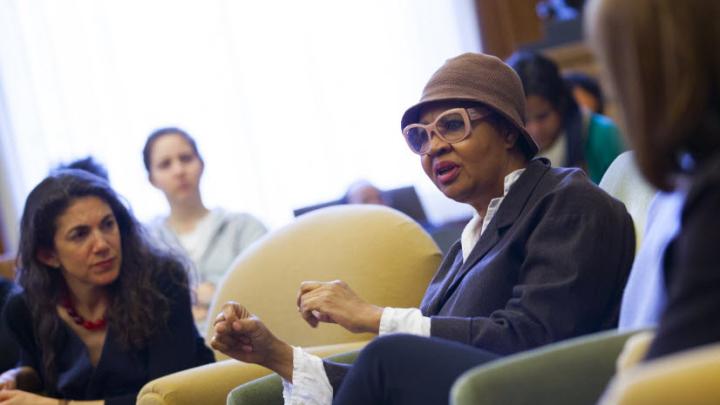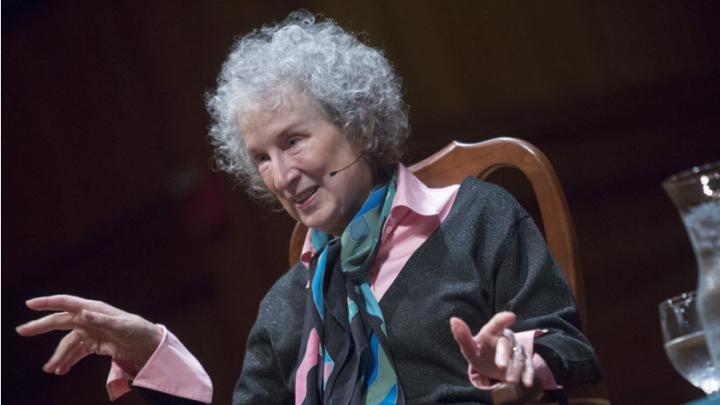The first Harvard LITFest kicked off this week with a smorgasbord of panels, workshops, and literary walking tours celebrating creative writing and the literary arts. “There is no way to overestimate the influence that Harvard has had on the world of letters,” said Bret Anthony Johnston, senior lecturer on English and director of creative writing at Harvard, and the three-day festival, which featured influential authors like Margaret Atwood, A.M. ’62, Litt.D. ’04, and Jamaica Kincaid, attested to that influence’s past, present, and future.
Novelist Kincaid, professor of African and African American studies in residence, was one of several faculty members to offer reflections on a life in letters. In the Tuesday panel “Building Lives, Building Careers: A Conversation about the Writing Life,” she discussed creative writing with her former student Samantha Perry David ’09 and journalist Johanna Berkman ’93.
“I grew up in this place where I had nothing to do but read,” recalled Kincaid, a former staff writer for The New Yorker and the author most recently of the novel See Now Then (2013). But for a long time, she said, “I didn’t know people still wrote the books I liked to read.” Determined to write, she moved to New York City early in her life, sleeping on friends’ couches and reporting on events with food so that she could eat. She described her professional success as “sheer coincidence and luck.” “It is a great part of a writer’s life, this luck, more than in most professions,” she said. “I had a lot of it, and I was never afraid to say yes to it.”
Her interlocutors followed different career trajectories. Berkman worked for several years as an analyst for Goldman Sachs after graduation and took advantage of her business background to become a reporter for The New York Times Magazine; she is currently working on a novel. David, now a real-estate developer, described how, as a creative-writing student, she “had to be walking through life in a very specific way, noticing things in a very deliberate fashion”—an awareness she keeps in mind as she designs spaces.
During a reading and panel discussion Wednesday night that featured members of the creative-writing faculty, other writers described similarly indirect paths to the literary life. Briggs Copeland lecturer on English Mark Poirier, who wrote the screenplay for the recently released film Hateship Loveship, based on an Alice Munro story, said that as an undergraduate, “I didn’t understand that writing was a living thing, that it was still happening at all.” He majored in chemistry before switching to English in his senior year, but he said it was not until taking a fiction seminar in graduate school that he encountered “living writers” and began aspiring to become a writer himself.
For aspiring writers today, several speakers acknowledged, the literary landscape is in flux. A panel on Thursday afternoon, “The Critic and the Crowd: Reviews and the Future of Literary Communities,” considered the changing practice of book reviews and literary criticism in a digital age. “I am deeply ambivalent and worried,” admitted Jeff Howe, NF ’10, assistant professor of journalism at Northeastern University. “It’s probably a better time than ever for someone to get attention, to get eyeballs—as long as you have a day job.”
Barriers to entry are lower than ever before—blogs and the online book community Goodreads allow everyone to share opinions—but Christina Thompson, editor of the Harvard Review and instructor at the Extension School, expressed concern at the decline of the infrastructure of editors and publications that nurture young writers and allow them to earn a living. “One gets better as a reviewer over time,” she said. “One of the problems with not having enough [professional] criticism nowadays is that people are not getting opportunities to learn.”
Indeed, as discussed by a panel exploring “The Futures of Reading and Writing,” not only the economics but also the material realities of literary practice—namely, books—are changing in the digital age. “The book has never been one thing. It’s been a hybrid object that’s undergone a million mutations to assume” its current form, argued Jeffrey Schnapp, faculty director of the metaLAB (at) Harvard and professor of Romance languages and literatures. Early compilations of written content, such as the papyrus, were read out loud; later, the costliness of parchment meant that abbreviations were common, and conventions like the paragraph and page did not develop until much later. “Why shouldn’t we see this most recent set of [digital] mediations as part of this continuity?” asked Matthew Battles, associate director of the metaLAB and coauthor, with Schnapp, of the forthcoming The Library Beyond the Book (May 2014). There are “a number of wonderful experiments” today, he explained, that treat the computer screen “not as a page by other means, but as a living environment of its own.”
Battles then described how, in a sort of contemporary serialized novel, author John Wray tweeted the adventures of a character named Citizen who had been cut from his 2008 novel Lowboy. Yet Twitter is a medium distinct from a novel or short story, Wray explained to The Awl; he tried to treat each tweet “as something that both advances the story and is self-contained.” (For instance: “Citizen found himself in a place he’d never been to before, but which corresponded to his prejudices perfectly. He loved when that happened.”) Indeed, said Schnapp, “I think [the digital world] brings us to…a less bookish bookishness, which is the sense that books are not these finite entities for eternity, but rather are elements in a larger conversation.”
LITfest concluded, appropriately, just in time to celebrate the awarding of the Harvard Arts Medal to writer and environmental activist Margaret Atwood, author of The Blind Assassin (2000) and Oryx and Crake (2009), among many other works. (The Arts Medal honors a distinguished Harvard or Radcliffe graduate or faculty member who has achieved excellence in the arts and has made a contribution through the arts to education or the public good; previous medalists include actor Matt Damon ’92 and the late singer-songwriter Pete Seeger ’40.) The award ceremony, in turn, launched the University’s annual arts showcase, Arts First.
Atwood told the audience, reported the Harvard Gazette, that as a writer, “You make a promise to the reader. The reader has entered into this process, which is going to be reading the book, and you have to deliver on that promise and not violate that promise.”
For more on the humanities at Harvard, see “Toward Cultural Citizenship,” about new pedagogical methods; “The Humanities, Digitized,” about the metaLAB and other initiatives in the digital humanities; “Ambitious of Doing the World Some Good,” a former undergraduate’s call to action; and a recent report on declining humanities enrollment.








